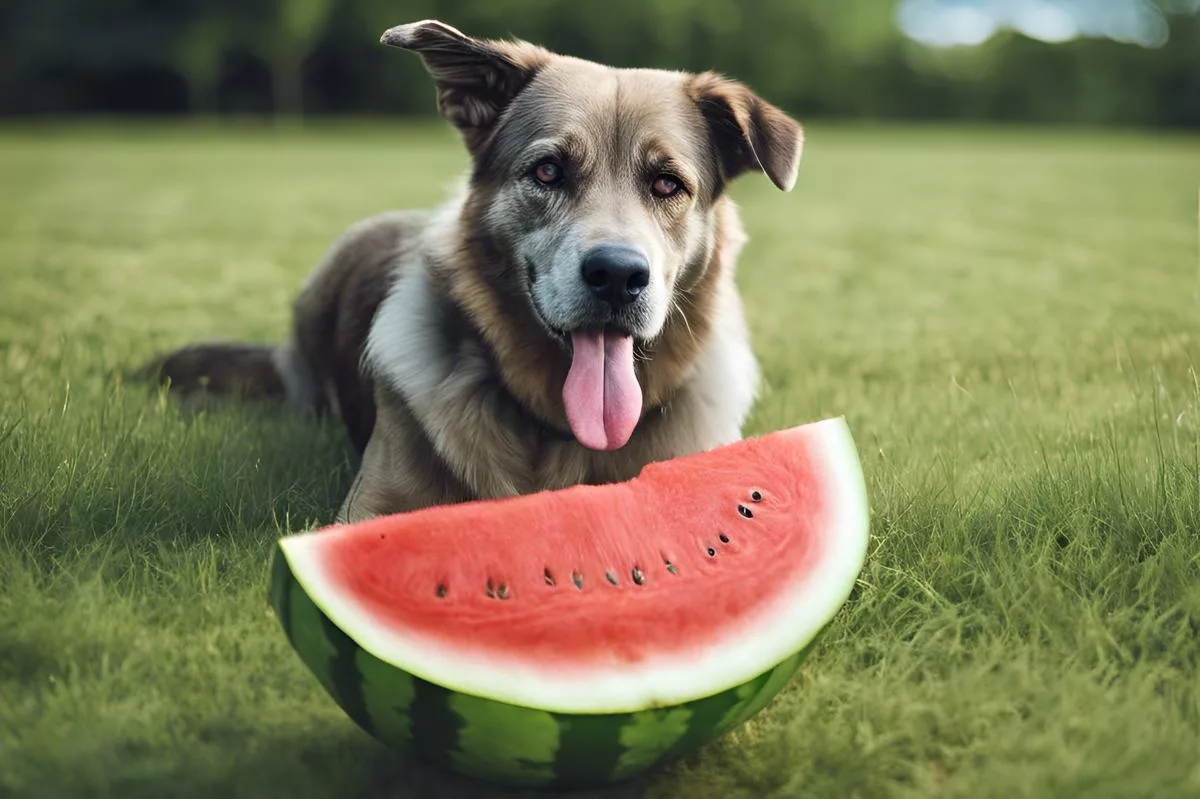Watermelon is a tasty and nutritious fruit that dogs can enjoy, but it’s important to remove the seeds and skin to avoid digestive discomfort. The fruit is packed with vitamins and minerals, as well as antioxidants that can support overall health. Moderation is key, as excessive consumption can lead to diarrhea. Slicing the fruit into manageable portions can reduce the risk and enhance the experience for dogs during hot months.
Can Dogs Enjoy Watermelon?
Watermelon is generally safe for dogs to eat, as it is packed with nutrients and provides hydration during hot months. However, it’s important to remove the seeds and skin, as they can cause digestive discomfort. Moderation is also key, as excessive consumption can lead to diarrhea. Slicing the fruit into manageable portions can reduce the risk and enhance the experience.
The captivating charm of the watermelon, an emblem of summer abundance, is irrefutable. The juicy interior, radiant hue, and invigoratingly sweet flavor make it a top choice for many. But as we relax on our porch steps, relishing the juicy chunk of the fruit, and our four-legged buddy flashes that typical longing gaze, we halt. Can dogs delight in the pleasure of watermelon? This article uncovers the answer to that intriguing question.
Watermelon and Dogs: A Fruitful Investigation
Our investigation commences with Green Matters, an environmentally responsible platform, and the American Kennel Club, an authority in the realm of dogs. Both organizations concur that watermelon is generally harmless for dogs, although there are some stipulations. The safety of this colorful fruit appears to hinge significantly on the specifics of its ingestion.
Watermelon, the paradigm of summer fruits, is teeming with nutrients that are as advantageous to our dogs as they are to us. Overflowing with vitamins A, B6, and C, it provides a critical nutrient uplift. Other crucial minerals present in it include potassium and magnesium, which promote overall health. Additionally, the fruit is a reservoir of antioxidants, reputed for their potential involvement in fighting certain diseases and supporting overall wellness.
A Nourishing Treat: Watermelon for Dogs
The fruit, composed of about 92% water, provides a hydrating quality that can be particularly comforting for dogs during the sultry months. However, it’s not just the flesh of the fruit that warrants consideration but also the seeds and skin. While not poisonous, these parts of the fruit present a tougher challenge for dogs to digest and can potentially trigger digestive discomfort. Therefore, it’s recommended to deseed the fruit and avoid the skin when offering watermelon to dogs.
When it comes to portion control, moderation is crucial. The fruit’s fiber content, although beneficial, can result in digestive upset, like diarrhea, if ingested in large quantities. Incorporating watermelon into a dog’s diet ought to be a slow, closely supervised process. Starting with small chunks and monitoring your dog’s reaction can aid in determining if it agrees with your pet.
Wise Consumption: Ensuring Safe Watermelon Intake for Dogs
As a conscientious pet owner, you should also double-check that the fruit is free from seeds and skin before it’s served. Slicing the watermelon into manageable, bite-sized portions that your dog can easily eat can further reduce risk and enhance the watermelon experience.
So, can our loyal companions partake in the joy of watermelons? Unquestionably. Dogs can safely relish watermelon if done so prudently and responsibly, under the careful supervision of their human guardians. The advantages are numerous, spanning from hydration to nutritional enrichment, making watermelon a delightful and beneficial supplement to a dog’s diet during the hot season.
Sharing the Joys of Summer: Watermelon for All
The question that once hung in the air is no longer. As the summer sun blazes and the watermelon ripens, we don’t need to savor this scrumptious fruit alone. With diligence and precaution, we can share the joy of watermelon with our furry friends, allowing them to partake in the tastes of summer’s generosity. After all, the season of sun is best when savored collectively.
1. Can dogs safely eat watermelon?
Yes, watermelon is generally safe for dogs to eat, as it is packed with nutrients and provides hydration during hot months. However, it’s important to remove the seeds and skin, as they can cause digestive discomfort.
2. What are the benefits of watermelon for dogs?
Watermelon is packed with vitamins and minerals, as well as antioxidants that can support overall health. It is composed of about 92% water, providing hydration that can be particularly comforting for dogs during the sultry months.
3. What parts of the watermelon should be avoided when feeding dogs?
It’s recommended to deseed the fruit and avoid the skin when offering watermelon to dogs, as these parts of the fruit present a tougher challenge for dogs to digest and can potentially trigger digestive discomfort.
4. Can excessive consumption of watermelon cause health issues in dogs?
Yes, excessive consumption of watermelon can lead to diarrhea, as the fruit’s fiber content, although beneficial, can result in digestive upset if ingested in large quantities. Moderation is key.
5. How should watermelon be incorporated into a dog’s diet?
Incorporating watermelon into a dog’s diet ought to be a slow, closely supervised process. Starting with small chunks and monitoring your dog’s reaction can aid in determining if it agrees with your pet.
6. How can watermelon be served to dogs safely?
Double-check that the fruit is free from seeds and skin before it’s served. Slicing the watermelon into manageable, bite-sized portions that your dog can easily eat can further reduce risk and enhance the watermelon experience.










